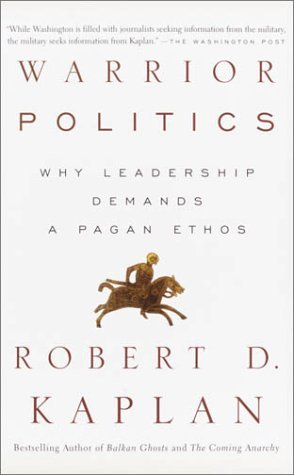Some writers, by dint of hard work, luck, mock outrageousness, and an acute instinct for the acceptable limits of dissent, are able to rise to the prized status of Tellers of Truth. Unlike Orwell—who was a bona fide secular prophet and, therefore, ignored—they are rewarded in their lifetimes with brisk-selling books, access to important media outlets, lucrative lectures, and buzz—lots and lots of buzz. Of this phenomenon, Robert Kaplan could stand as Exhibit A. His new book, Warrior Politics: Why Leadership Demands a Pagan Ethos, is blurbed by three titans of industry and finance, two former secretaries of state, a former national security advisor, Newt Gingrich, and John Gray of the London School of Economics. The monumental fuss is over a very short essay on foreign policy that makes precious few concrete recommendations. Without the bibliography, endnotes, and the like, it amounts to an anemic 155 pages. In fact—and this may explain the businessmen’s enthusiasm—the table of contents contains executive summaries of each of the chapters, allowing the gist of the book to be absorbed in just under two minutes. My late grandfather, a union man, would have called that not bad work, if you can get it.
Still, the meager literary merits of Warrior Politics by no means render the book worthless. Rather, its warm reception tells us a good deal about what a great many of our betters think about the future—and, therefore, about us. Completed before September 11—and, so far as I can tell, not reworked in response to those events—Kaplan’s book seeks to limn all of the relevant issues confronting American rulers and strategists in the 21st century. To this task, Kaplan brings a particular point of view. “I am,” he says, “not an optimist or an idealist”—unlike most Americans, who
can afford optimism partly because their institutions, including the Constitution, were conceived by men who thought tragically. Before the first president was sworn in, the rules of impeachment were established. . . . Our separation of powers is based on that grim view of human behavior.
Robert Kaplan is on the left wing of what might be called the “realist” school of foreign policy; he argues that progress—small “p”—is not assured and that, in light of the century now behind us, regress is a distinct possibility. For instance, the benefits of technology, though real, are oversold and distributed unevenly: By 2010, “[O]f the 70 percent of the world still not connected [to the internet] . . . about half will never have made a phone call.” (Horribile dictu!) Kaplan believes that the United States, ideally, should promote “human rights” but doubts the ability of democracy to accomplish this since, in many cases, political freedom can lead to “the violence that liberal societies abhor.” More pointedly,
There is nothing more volatile and more in need of disciplined, enlightened direction than vast populations of underpaid, underemployed, and badly educated workers divided by ethnicity and beliefs.
Kaplan is not speaking as an armchair quarterback. Wandering the world while gathering material for previous books (including one on the fierce warriors of Afghanistan), he learned that order often had to be imposed by an authoritarian hand in order to control anarchy and arrest mass bloodshed.
The “pagan ethos” of the book’s title refers to the Greco-Roman axis of Western civilization, which was (as Kaplan describes it) by turns tragic, adaptable, wise—and strong. Rome, for many centuries, was able to bring peace and prosperity to a large area of the world principally because she was feared. By contrast, Kaplan presents Christendom as having proved ineffective and otherworldly, placing the highest good above the common one, and fundamentally misjudging international relations.
Kaplan ignores most Western liberals (e.g., Locke and Mill) while seeming somewhat uncomfortable with Machiavelli as well. He believes the author of The Prince “may go too far [in his glorification of force] . . . but some academics and intellectuals go too far in the other direction.” Instead, he makes Thomas Hobbes his intellectual North Star. Peace, says Kaplan, today requires a global Leviathan—an all-encompassing megapower capable of employing terrific violence to shape and ensure world order. That role—once played by the British Empire but assumed now by America as a consequence of its having won the Cold War—is not only justified but necessary: “We and nobody else will write the terms for international society,” Kaplan claims in his penultimate chapter.
Kaplan simultaneously praises American particularism and consigns it to the dustbin of history:
[F]or American power to endure, it will need to be impelled by a more primitive level of altruism than that of the universal society it seeks to encourage. American patriotism—honoring the flag, July Fourth celebrations and so on—must survive long enough to provide the military armature for an emerging global civilization that may eventually make such patriotism obsolete.
Here Kaplan admits, if only backhandedly, that the price of embracing Hobbes’ vision may be precipitously steep. Still, he believes the results will be worth the cost. Robert Kaplan seems to have “progressed” (or is it “regressed”?) a long way since the publication two years ago of his previous book, The Coming Anarchy, in which he stated that the plans and desires of the global managerial elite must inevitably be defeated by the masses of the world, who want something entirely different for themselves. That he is afforded as much respect as he is by our mandarin class is not an encouraging prospect.
[Warrior Politics: How Leadership Demands a Pagan Ethos, by Robert D. Kaplan (New York: Random House) 198 pp., $22.95]

Leave a Reply